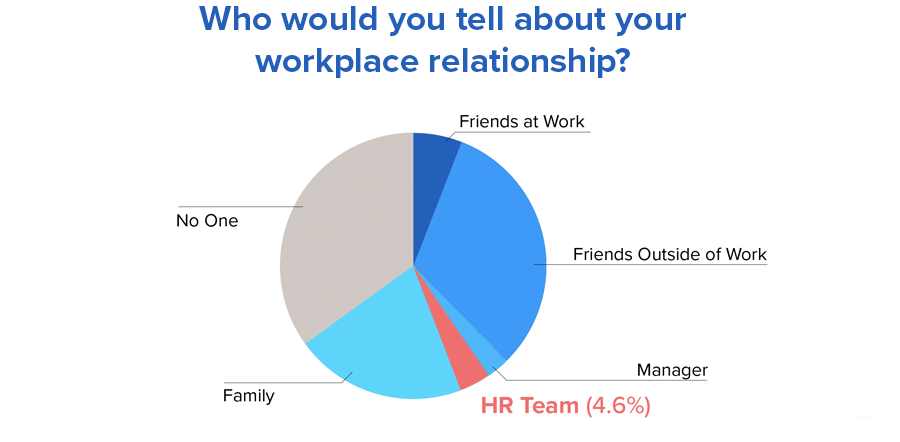New eLove @ Workf Survey Sheds Light on Office Romance
by Andy Przystanski
March 08, 2018 - Namely
Talk about a labor of love. With our recent Love @ Work Survey, Namely discovered how employees really feel about dating colleagues. The results—based on over 500 employees from across the country—yielded new insights into just how prevalent office romances are, and whether HR teams should play a role in addressing them.
Lovestruck at Work?
While true love might still be hard to find, a surprisingly large number of employees seem to be finding something at work. 40 percent of survey participants indicated that they have engaged in an intimate relationship with a coworker. Five percent of those romances were between a direct report and a manager.
Notably, our survey data also revealed that millennials were more likely than their colleagues to date a manager.
So while workplace relationships are clearly common, do they noticeably impact employee productivity? 70 percent of office sweethearts reported that their relationship gchanged nothing.h Of the remainder, half actually claimed it boosted their productivity. This suggests that some of the hand-wringing over office relationships may be misplaced, at least according to employees.
Kiss and Tell
HR professionals often like to think of themselves as company confidantes.
Turns out theyfre not even the third wheel. No surprise here: when it comes to
talking about love, employees are generally tight-lipped.
According to our survey, less than 5 percent of workers would willingly tell their HR team if they were in a workplace relationship. Even if company policy required employees to do so, still only 42 percent would comply. Men were twice as likely to keep an office romance a secret.
Call it a trust issue. The reason why employees are reluctant to discuss their relationship is because they donft believe HR will keep it confidential. Only 14 percent of respondents fully trusted their HR team on the topic of love. Making matters worse, nearly half of workers had little-to-no confidence that HR would keep the romance to themselves. In other words, they view their HR team as friends of the business, not employees.
Legislating Love
Despite how common workplace relationships are, 61 percent of respondentsf
companies did not have written policies addressing them. That might be for a
good reason, as therefs some doubt as to whether relationship policies or love contracts
actually work.
While most arenft subject to them, employees certainly have strong opinions as to how relationship policies should work. Some of the surveyfs most unexpected insights came from this hypothetical question: in cases where a manager is dating a direct report, how should HR respond?
A third of respondents suggested that the manager should be transferred to a new department. Surprisingly, 29 percent thought it was the direct report who should be transferred. Rounding out the list, a handful of romantics (21 percent) believed HR should gdo nothingh and stay out of the way of love.
There is one bit of good news for fans of policymaking. While relationship policies are relatively rare, sexual harassment policies and programs seem to be quite common. 62 percent of respondents have participated in anti-harassment training, and 6 in 10 employees say their companies and HR teams are well-prepared to handle cases of sexual harassment.
As winter transitions into spring, donft be surprised to see love blossom at
work. That said, HR teams who try to stand in the way might find employees
reluctant to open up. Our findings suggest that addressing workplace
relationships takes a nuanced approach, not hard policies or farcical love
contracts.
To learn how your team can better respond to workplace relationships, read our full coverage of the Love @ Work survey and other relevant content by clicking below.
Andy Przystanski
Andy Przystanski is a Senior Content Specialist at Namely, the all-in-one HR, payroll, and benefits platform built for today's employees. Connect with Andy and the Namely team on Twitter, Facebook, and LinkedIn.
